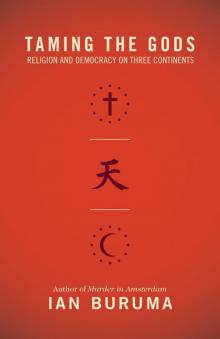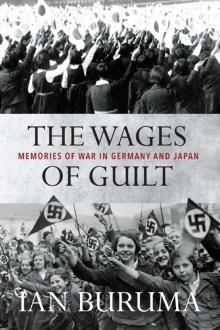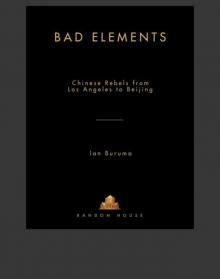- Home
- Ian Buruma
Year Zero Page 6
Year Zero Read online
Page 6
It is surely no coincidence that so many Japanese and German films about the occupation period show black American soldiers ravishing native women, as though their race made the humiliation of the defeated even worse. A German pamphlet warned: “We’ll tell you right now, we’ll shave off your hair, the blacklist is ready, waiting for when times will have changed.”56 In fact, some women received this treatment already in 1945. There was a case, in Bayreuth, of a woman who was set on fire. In Würzburg, three men were arrested for organizing a terror group called the “Black Panthers,” who threatened to cut the hair off “all German girls who go walking with colored soldiers.”57 A twenty-year-old former Nazi wrote about the fraternizing women: “Have the German people no honor left? . . . One can lose a war, one can be humiliated, but one need not dirty one’s honor oneself!”58
Again, like Takami Jun’s use of the word “shame,” this reference to honor is revealing. The honor of women (let alone their right to decide for themselves whom to consort with) is beside the point. It is the honor of men that is at stake here. They are the ones who feel humiliated. This was, of course, common to all societies traditionally dominated by men. Postwar conditions upset the old order. Women were no longer under male control. Perhaps that was their greatest sin.
One way of looking at these resentments is to link them directly to reactionary political views which the Allies wished to stamp out, if not necessarily in their own countries, then at least in the nations they had just defeated. An American army lieutenant named Julian Sebastian Bach, who later worked as an editor for Life magazine, wrote an account of the occupation of Germany. He believed that “The extent to which German men accept ‘fratting’ is the thermometer which registers the degree to which they accept defeat, contain their national pride and look forward to a new and more congenial way of life. Obviously the sight of a German woman with an American conqueror enrages an ‘unreconstructed’ German more than a German who is anxious to cooperate with us.”59
Takami Jun expressed a very similar opinion in his diary, only a few days after his initial reaction to the shameful behavior of those giggling station attendants. The scene is again at a railway station. He watches a Japanese woman, leaning out of the train window, saying “baibai!” to her American soldier friend, seemingly oblivious to the hateful stares of other Japanese passengers. Takami sees a special pathos in the situation. In the eyes of the bystanders, including himself, the girl, as he puts it, “came to look like a woman at a ‘special comfort facility.’” But the girl, in fact not a hooker at all, doesn’t seem to care. Indeed, she looks “proud to behave shockingly with an American soldier.” This, Takami predicts, will become a normal sight in Japan. What’s more, he says, “It would actually be a good thing . . . Best of all would be a deluge of such sights. It would be good training for the Japanese. For then, in time, more natural, even beautiful social relations will come into being.”60
What strikes me as humane and even sensible in the case of Takami seems naïve and self-serving in Julian Bach, the U.S. lieutenant in an occupation army. For the jealousies and resentments felt by men, and also women, towards the fraternizers among their own people were hardly confined to unreconstructed fascists. Humiliation was no doubt felt more keenly by the defeated. But it was a common sentiment among the liberated, too, even those who had greeted the young Allied soldiers with flowers when they first arrived as saintly victors.
A popular Dutch song after the war was called Girl, Watch Out for Yourself.
Brave boys, proud warriors
Came here from afar
They brought us freedom
So they should have some fun
But many a “Dutch girl”
Soon threw away her honor
For a packet of cigarettes
And chocolate bar . . .
Many who hailed with the Huns
Have already paid the price
Girl, you betrayed the honor of your country
Just as much . . .
No Dutch boy will look at you again
Since you left him in the cold . . .
It is all there: national honor, loose morals, material greed, the local boys spurned. Most revealing is the direct comparison of girls who had relations with the German occupiers and the liberators from Britain or North America. The implication is clear. What mattered was female immorality. That is why some Dutch girls who fraternized with Canadians had their hair cut off by angry mobs, just like the “Jerry whores” (Moffenhoeren).
Several things made the moral panic unleashed by foreign occupation, in liberated countries as much as among the defeated, more acute. Misguided occupation policies did little to soften the resentment of local men. Allied troops requisitioned cinemas, cafés, dance halls, and swimming pools for themselves. These were off-limits to the native population, but not to local girls who managed to pick up an Allied soldier. Naturally, this was resented. In the city of Utrecht, a group of young Dutchmen grabbed some girls who had been seen with Canadian soldiers and tried to shave their heads. The Canadians felt protective. Knives were pulled, stones were thrown, guns went off. Nobody got killed in this instance, although several people were wounded.
The ban on organized prostitution by the Allied authorities also contributed to the high rate of venereal diseases. A popular expression among the Americans in Germany, just after the war was finally declared over, was “VD follows V-E.” In the American occupation zone in Germany, VD rates are said to have gone up 235 percent between V-E Day and the end of 1945, that is, from 75 per 1,000 soldiers per year to 250 per year.61 This despite distribution among GIs, at railway stations and Red Cross Clubs, of “V-packets,” containing condoms and potassium permanganate pills. In Holland, VD rates had already gone up considerably during the German occupation, and rose further immediately after the war. The press published scare stories about more than 10,000 women who were supposedly infected with diseases without even realizing it. There were similar scares in France.
In southern Italy, the moral panic, equating the danger of VD with national humiliation, found a typically histrionic expression in a famous book by Curzio Malaparte titled The Skin. Malaparte was a fabulist, something he never denied, and was more than a little bit sympathetic to the fascists, but he had a gift for expressing a popular mood, even if details were made up for effect. The Allied invasion is compared in his book to a plague, in which “the limbs remained seemingly intact,” but “the soul festered and rotted.” During the German occupation, Malaparte explains, “only prostitutes” had relations with the occupiers. But now, under the Americans and British, “as a result of this loathsome plague, which first corrupted the feminine sense of honor and dignity,” shame has infected every Italian home. Why? Because such was “the baneful power of the contagion that self-prostitution had become a praiseworthy act, almost a proof of patriotism, and all, men and women, far from blushing at the thought of it, seemed to glory in their own and the universal degradation.”62
This was probably an exaggeration. But many people, apart from the author, may have felt it that way. Sleeping with the foreign soldier was the same as prostitution. If it was voluntary, so much the worse.
GIs in France were shown a documentary film titled Good Girls Have VD Too. One of the humiliations suffered by women in occupied cities, in Amsterdam no less than in Tokyo, was to be regularly rounded up at random for VD checks. No doubt the scarcity of medical facilities in the postwar chaos, the bad hygienic conditions, and the relative inexperience of many young men and women, often raised in socially conservative or puritanical societies, compounded the medical problems. But Malaparte, in his overwrought manner, put his finger on the sorest spot: women, for a variety of reasons, were doing as they liked.
Not everyone disapproved. Some progressively minded people, such as the Dutch gynecologist and sexual reformer Wim Storm, saw merit in fraternization: a breakthrough for female emancipation a
nd a welcome end to such outdated notions as male privilege and wives’ submission to their husbands. Women seeking happiness in the “khaki arms” of Canadians, “getting to know a new language, the jitterbug, and love,” well, “all these women know exactly what they want.” To claim that they are prostituting themselves for a bar of chocolate or a few cigarettes “is a terrible insult.”63 The best solution to the VD problem was to hand out more condoms to women and promote sex education among the young.
But the likes of Storm were a minority, and they would lose the argument, at least for the time being. The voices for moral regeneration, for rebuilding society on a traditional moral basis, were stronger in an atmosphere of moral panic. This was true in the Netherlands, where even a liberal newspaper such as Het Parool, founded by the anti-Nazi resistance, fired an editor for printing an article in favor of handing out contraceptives to women: “We see it as our duty to educate our nation’s people towards higher moral norms . . . and resist all forms of dissipation.”64 It was true also in France, where the provisional government under General de Gaulle was deeply worried that wartime occupation and liberation had undermined public morals, posing a fatal threat to “the French race.”65 Laws against abortion and adultery in liberated France were as strict as they had been under the Vichy regime, in some cases even stricter.
The puritanical reaction to what was regarded as moral dissolution was by no means confined to religious conservatives or the political right. In France, a large number of men and women in the resistance had joined the Communist Party for romantic or idealistic reasons. Wartime conditions had loosened the rules of conventional morality. But the postwar French communists, under the leadership of Maurice Thorez, put a swift end to this. Dedication to the Party, and a stable family life, were promoted with zeal. “Debauchery” resulting from war and fraternizing with foreign troops was denounced. In Germany, too, where communists tightened their control of the Eastern zones under their Soviet patrons, political repression came with a new moral order. Erich Honecker, leader of the Communist Youth Federation, tried his very best to wean young women from such frivolities as swing music and sex, hoping to gain their support for the communist cause. But he felt frustrated in his efforts. The problem, he said, was clear: “We have to overcome their drive to take pleasure in life [Drang nach Lebensfreude].”
Erich “Honni” Honecker—no stranger to life’s pleasures himself, having had several affairs with much younger women—needn’t have worried unduly. A state of exultation cannot last. The rush of liberation had already begun to fade by the end of 1945. Foreign troops were going home in ever greater numbers, even though large military bases would remain in Germany and Japan, and to a lesser extent in Britain and Italy as well. Moral panic laid the ground for a conservative reaction. Fear of female sexual license, as well as a common desire for bourgeois stability, after years of danger, chaos, and deprivation, would soon restore a more traditional order to life in the liberated as well as the defeated nations. In the 1950s the summer of ’45 would already seem like a distant memory. Sexual liberation had to wait for another twenty years, when the birth control pill arrived along with the second wave of Anglo-Saxon hedonism, when the Beatles and the Rolling Stones unleashed something Glenn Miller and Benny Goodman could only have dreamed of.
Even so, the postwar disorder, however temporary, was not without some positive consequence. Benoîte Groult’s wish to remake her own freedom did not rest on a complete illusion. Women in France were given the right to vote in March 1944 by the provisional government even before France was liberated—a right born from the dearth of men; the assumption was that wives would represent the views of their absent husbands. The same right came to Italian women in 1945, to Japanese a year later, to women in Romania and Yugoslavia in 1946, and to Belgian women in 1948. No matter how much some people might have wished, the world could never quite go back to the way things had been before.
CHAPTER 2
HUNGER
If the Canadians arriving in May were seen by some Dutch people as gods, there is another, equally exalted image forever associated with liberation in the Netherlands: Operation Manna. Decades later people still spoke with tears of gratitude of the “Swedish white bread” donated by the Red Cross, dropped over Holland in May 1945 by RAF and U.S. Air Force bombers. As a child I envisaged this extraordinary event literally as loaves of white bread raining from the sky. In fact, the Avro Lancaster and B-17 bombers, swooping low over the red-tiled roofs dotted with cheering people waving white kitchen towels, dropped bags of flour, as well as crates filled with chocolate, margarine, corned beef, powdered eggs, cigarettes, coffee, and chewing gum. The British called it Operation Manna, the Americans Operation Chow Hound.
For the American and British bomber pilots, dropping food over Holland was a welcome diversion. One British pilot wrote a note, found among the tins of chocolate and bags of flour:
To the Dutch people.
Don’t worry about the war with Germany. It is nearly over. These trips for us are a change from bombing. We will often be bringing new food supplies. Keep your chins up. All the best.
An R.A.F. man.1
The people were more than grateful; many of them were starving. In May, just after Liberation, the New York Times mentioned a “starvation hospital” in Rotterdam, where “wasted humans” were “receiving six light feedings daily.” Men and women of thirty, the report says, “appear twice that age, their sunken eyes, yellowed skin and horribly swollen limbs revealing the extremity of their plight when they were rescued.” Meanwhile, there were still restaurants in the city, providing a “well-dressed clientèle” with “elaborate meals and plenty of various beverages.” Indignant Dutchmen, “who know the other extreme, quickly retort: ‘Black Market.’”2
This was the situation in much of the European continent, and many places were worse off than Rotterdam. Millions had died of hunger in parts of the Soviet Union. But there was something particular about Dutch starvation; it was the only western European country subjected to hunger as a deliberate collective punishment. Slavic peoples had been subjected to this treatment, but not western Europeans.
Doing their part to assist Montgomery’s disastrous effort to bridge the Rhine at Arnhem in September 1944, Dutch railway workers had gone on strike. In retaliation, the Germans cut off food supplies to the still occupied western part of the country. They also switched off the electricity, flooded fertile land, and banned Dutch citizens from using trains. On top of everything else, the “hunger winter” of ’44/45 was unusually cold. Eighteen thousand people starved or died of diseases related to malnutrition. The survivors burned up their furniture to keep warm, and subsisted on pets, if they could still be found, or dead horses, sliced up as soon as they collapsed in the streets, or soup drawn from stinging nettles and fried tulip bulbs.
The problem with starvation is that too much food, or the wrong kind of food, can kill a person too. Even cookies, handed out by friendly Canadian troops, could be catastrophic. They caused an acute thirst, relieved by gulps of cold water, which made the undigested biscuits swell, resulting in burst stomachs, and a quick death.
There was hunger almost everywhere in the world, in liberated countries and in the defeated ones too, where all services had broken down and normal economies had ceased to function. There were other places, apart from Holland, where food had to be dropped from the skies. The teenager in Nosaka Akiyuki’s American Hijiki watches an American bomber drop a steel drum attached to a parachute. At first, the Japanese villagers think it might be another devastating bomb. They had heard about Hiroshima. There, too, the bomb had allegedly been attached to a parachute. However, when the container fails to explode, hunger and curiosity trump fear. The villagers pry it open and find food parcels, which they guess must have been meant for the prisoners in a nearby POW camp. But charity to strangers is too much to ask in desperate times. The parcels contain bread, chocolate, and chewing gum, whi
ch the children chomp on for days, passing on the hardened, tasteless morsels from mouth to mouth. There is also a parcel filled with brownish stuff, which the villagers assume must be seaweed, or hijiki, a much prized delicacy in Japan. It tastes so bad, even after boiling, and is so hard to digest, that they wonder how the Americans can stomach it. Still on the assumption that the dark tea leaves are “American seaweed,” they eat their way through the whole supply.
The worst cases of hunger in a famished year were in the concentration camps. The Japanese camps in Southeast Asia were appalling. Most camps in Germany, where slave workers and survivors from death marches had been left to rot by the German authorities, were even worse. The filthiest camp, by most accounts, was Bergen-Belsen, built originally as a camp for “exchange Jews,” well-connected men and women who might be exchanged for German prisoners. Few exchanges actually took place. Political prisoners and criminals were added to the camp population. Finally, in late 1944, it became a dumping ground for Jewish survivors of the death camps in the path of the Soviet Red Army. One was Anne Frank, who died of typhus less than a month before the camp was liberated. Already cramped from the beginning, Belsen was so overcrowded by early 1945 that people literally slept on top of each other, with no sanitation, deprived in the end of any food or water. Some desperate people, who still had enough strength left, cannibalized the corpses piling up outside the huts. Only the SS guards had plenty of food. The camp commandant, Josef Kramer, had his own private supply of pigs.
Since the British had never seen anything like this, they had little idea what to do. All they could offer the starving people were their own army rations of ham, bacon, baked beans, sausages, and steak and kidney pie. Shrunken human intestines can no longer take such food; it goes right through the body. Even so, people tried to wolf the rations down. About two thousand people died as a result.

 A Japanese Mirror
A Japanese Mirror Taming the Gods
Taming the Gods The China Lover
The China Lover A Tokyo Romance
A Tokyo Romance Theater of Cruelty
Theater of Cruelty Year Zero
Year Zero The Wages of Guilt
The Wages of Guilt Murder in Amsterdam
Murder in Amsterdam Bad Elements
Bad Elements Their Promised Land
Their Promised Land Occidentalism
Occidentalism Anglomania
Anglomania Inventing Japan: 1853-1964 (Modern Library Chronicles)
Inventing Japan: 1853-1964 (Modern Library Chronicles) The Missionary and the Libertine
The Missionary and the Libertine